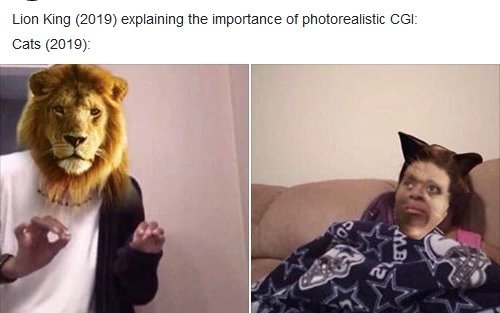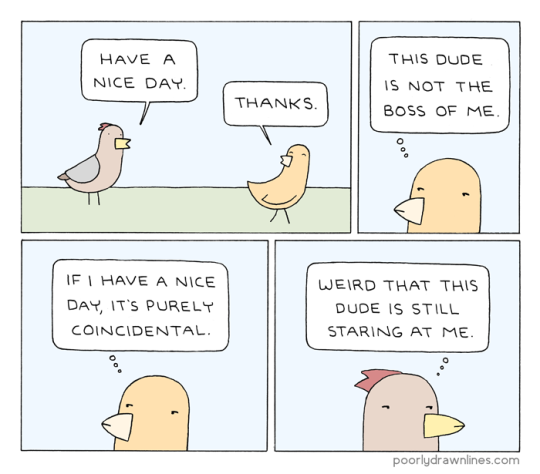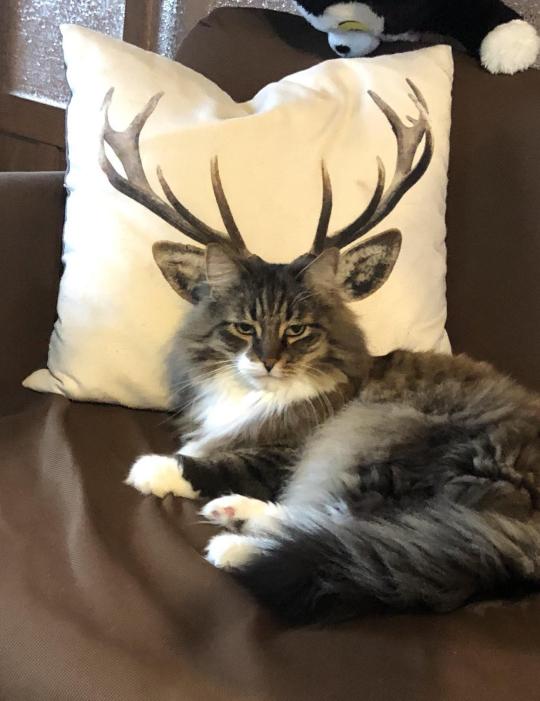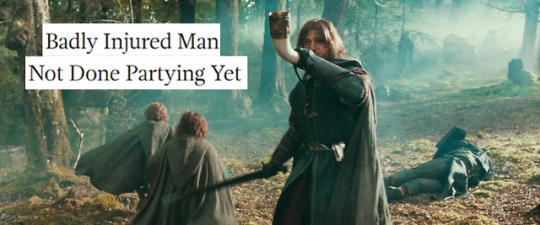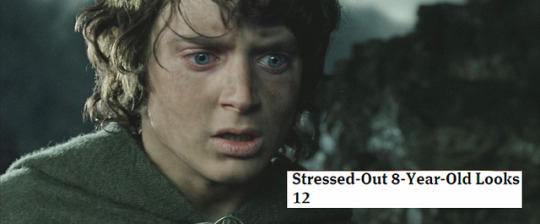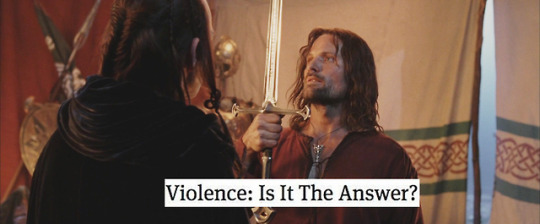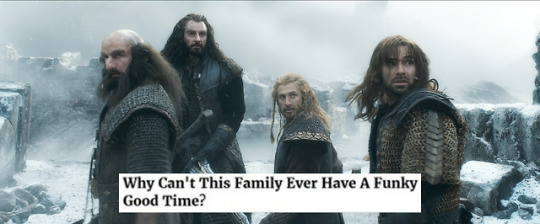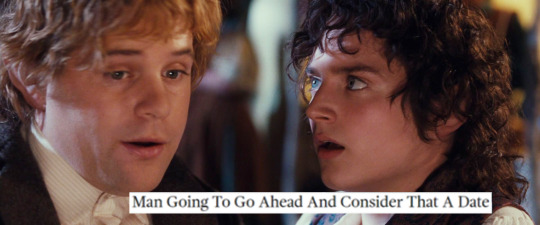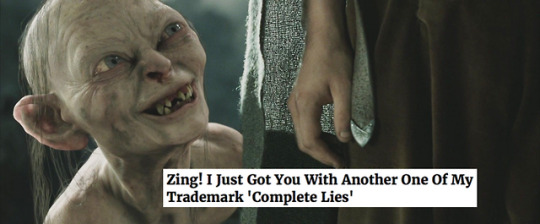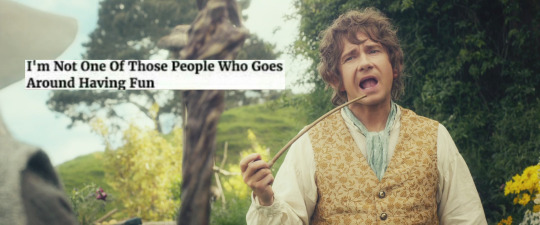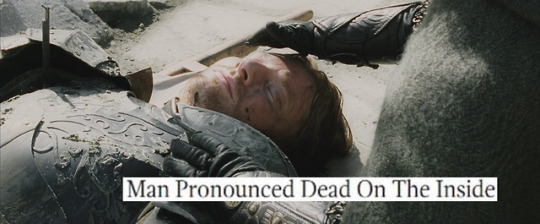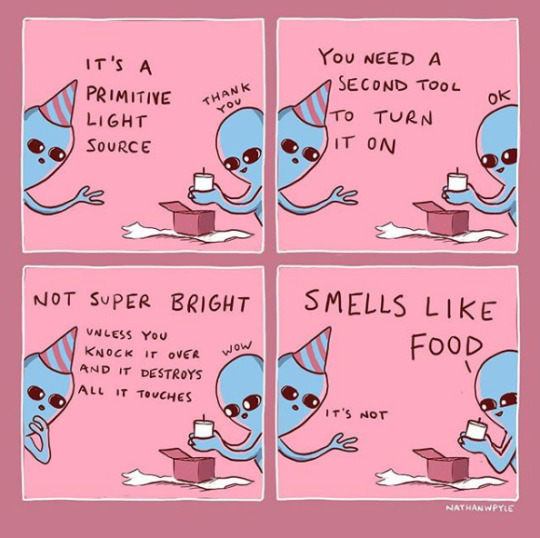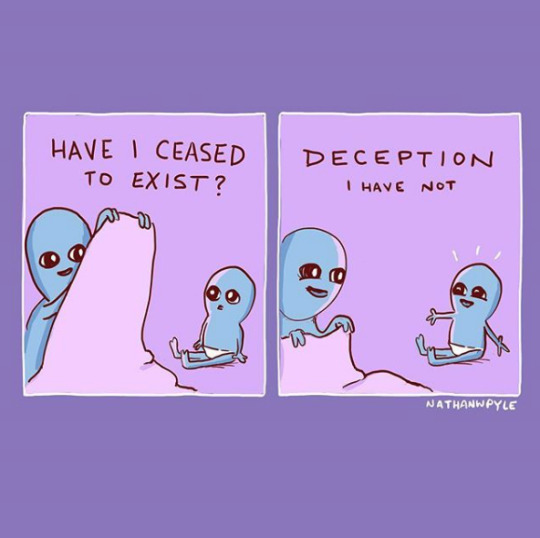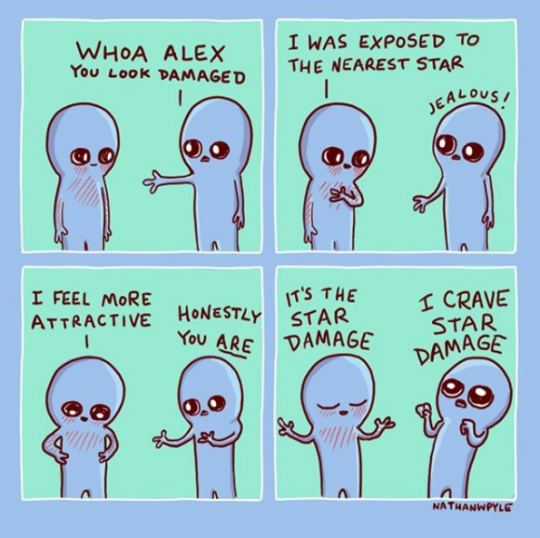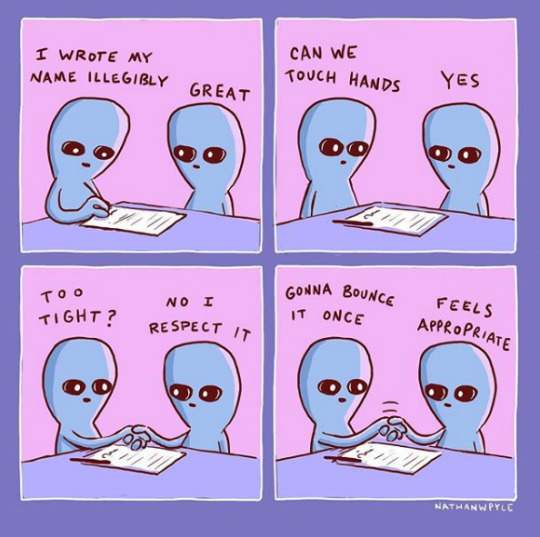Writing. Reading. English Majoring. Doctor Who and other nerdishness. Odd bits of this and that.
Don't wanna be here? Send us removal request.
Quote
Human freedom involves our capacity to pause between the stimulus and response and, in that pause, to choose the one response toward which we wish to throw our weight. The capacity to create ourselves, based upon this freedom, is inseparable from consciousness or self-awareness.
Rollo May (via aspiritualwarrior)
217 notes
·
View notes
Text
“Love and compassion are necessities, not luxuries. Without them humanity cannot survive.”
— Dalai Lama (via naturaekos)
7K notes
·
View notes
Photo









Honey Scraping Stimboard for Anon
(X,X,X,X,X,X,X,X,X)
7K notes
·
View notes
Photo


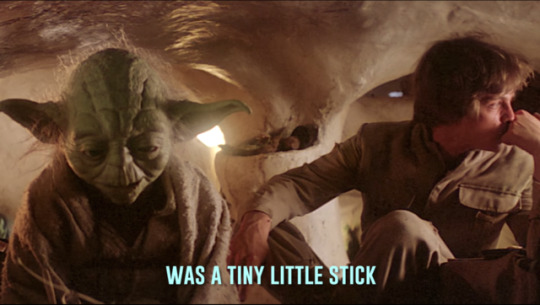
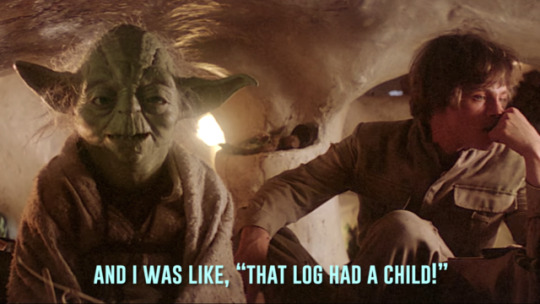
this is the most underrated part of rockin’ and rollin’ yoda
211K notes
·
View notes
Quote
I hold this to be the highest task of a bond between two people: that each should stand guard over the solitude of the other. For, if it lies in the nature of indifference and of the crowd to recognize no solitude, then love and friendship are there for the purpose of continually providing the opportunity for solitude. And only those are the true sharings which rhythmically interrupt periods of deep isolation.…
Rainer Maria Rilke, Rilke on Love and Other Difficulties (via weltenwellen)
88 notes
·
View notes
Text
so, theres a severe lack of easy-to-access, helpful online resources for psychotic and schizospec disorders (google is literally useless wrt this for some reason), and i’m gonna attempt to remedy that. all of the resources below are resources i’ve personally found useful
firstly, i’ll tentatively drop a support group: i’ve personally been to hearing voices groups and have found them helpful with the particular empathy other psychotic people provide + the lack of pathologization, something i absolutely cannot get anywhere else. i suggest looking over their resource page, but i will note that for some psychotic people, especially people actively in a psychotic episode and experiencing significant delusions, this may not be helpful due to the inherent validation it provides! be careful in any case, and feel free to consume critical (1) perspectives on it as well.
also, forums can be nice. i suggest psych forums as well as schizophrenia forums (note: second is for both people with schizophrenia and caretakers/partners/families of people with schizophrenia, and the former has subcategories for every mental illness)
understanding psychosis: resources and recovery, very comprehensive but easy to read examination of psychotic symptoms and steps towards recovery. also has a helpful section on side effects of medication + considerations when deciding if medication is right for you
CBT for psychotic symptoms (consider going through this with a therapist, but it can be helpful alone too) + skip to appendix 2 (pg. 133) for worksheets
dealing with psychosis toolkit, self explanatory. consider looking at other things on earlypsychosis as well
what is schizoaffective disorder? (generally reliable information, i have a few issues with some of the wording though)
NAMI facts on schizophrenia and NIMH publications on psychosis
60 coping strategies for hallucinations
dealing with psychosis: full workbook, pretty self explanatory but very helpful and also relatively easy to read
now, for those without psychosis: how can you help people with schizospec/psychotic disorders?
the do’s and don’t’s of helping a family member (or friend!) in psychosis
helping someone with psychosis (tumblr post)
psychosis first aid guidelines for loved ones
dealing with unusual thoughts and behaviors factsheet
steps for working with delusions
if you’re a friend, family member, or at all close with someone with schizophrenia or psychosis i heavily encourage you to research as much as you can, and above all else listen to what schizophrenic and psychotic people say. if you ever find yourself in a situation where you don’t know what to do, it never hurts to ask the person in question how you can help them.
book recommendations (with links):
understanding your schizophrenia illness
cbt for psychosis: a symptom based approach
psychosis, trauma and dissociation: emerging perspectives on severe psychopathology
when the sun bursts: the enigma of schizophrenia (title sounds cheesy, is actually really good)
cognitive therapy for schizophrenia
living outside mental illness: qualitative studies of recovery in schizophrenia
trauma and psychosis: new directions for theory and therapy
schizoaffective disorders: international perspectives on understanding, intervention and rehabilitation
recovered, not cured: a journey through schizophrenia
note: the majority of these books aren’t very accessible as they’re meant for clinicians, but these are just books that i’ve found helpful in general
add anything else that’s been helpful for you accordingly! if you’re nonpsychotic feel free to reblog as well, as it could be helpful for any followers you might have that are psychotic
6K notes
·
View notes
Text
I’m going to work tomorrow at 6am and I don’t leave until 6am Sunday. My first 24 hour shift. Gonna deliver babies.
😬
157 notes
·
View notes
Photo
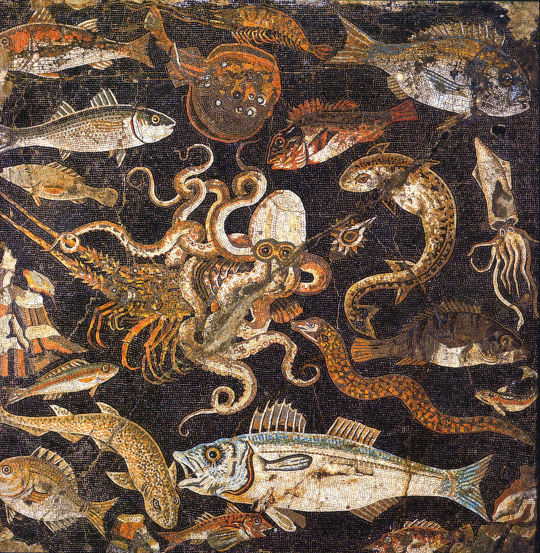
Mosaic from the impluvium of the House of Gometric Mosaics, Pompeii
Roman, 1st century AD
31K notes
·
View notes
Text
Hi–I’m briefly returning from my tumblr hiatus out of spite because i’m lowkey salty disappointed that every list I see recommending SFF novels with queer themes are just the same couple of books over and over again.
Are those books good? Sure! But there’s so much more.
So here’s my list of lesser-known SFF novels with queer characters:
Swordspoint by Ellen Kushner: Originally published in 1987, this classic novel is set in a bisexual society and features political machinations, drama and intrigue, and lots and lots of swordfighting. This was the first novel with prominent LGBT themes that I ever read, and it aces the test of time.
Tremontaine by Ellen Kushner, Etc.: This is a serial novel and a prequel to Swordspoint, but they can be read independently of one another. Tremontaine has the benefit of being much longer, so there’s much more to enjoy, and has 100% more lesbians and PoC.
The Warrior’s Path by Catherine M Wilson: All I had to be told to be sold on this book was “historical fantasy based on the bronze age, with a matriarchal society and lots of lesbians.” These are more character-driven than plot-driven, which I think really, really works. Book 1 of 3.
The Stars Are Legion by Kameron Hurley: I would be remiss if I didn’t mention this book, even though Hurley’s work is consistently too biopunk squicky for me. This is a book about space warfare and intrigue, and there are absolutely zero male characters. It is. Very very icky, though. Lots of blood and viscera and other fluids.
Ninefox Gambit by Yoon Ha Lee: Military scifi. Super interesting technology all based on every world in the empire sticking to the same calendar (no really, but it works). To put down a calendrical rebellion, they turn to a disgraced (lesbian) soldier and an undead traitor (bisexual) general. The sequel, Raven Stratagem, has a trans man as one of the major PoV characters, and it’s worth noting that the author himself is also trans.
Fire Logic by Laurie J. Marks: This is a slow-paced character driven fantasy. A country has been overrun by invaders, and though there’s an active rebellion, the situation is desperate. It focuses on three very different (though equally queer) people, who, together, can change the course of history. The sequel, Earth Logic, is also fantastic. (There is a 3rd one but I haven’t read it yet)
Warchild by Karin Lowachee: This is a space opera, but also a portrait of the effects of PTSD on children. It’s also the book that convinced me that second-person narration is good, actually. There are several significant queer characters in this book, and the sequels, Burndive and Cagebird (PoV character in this one!), though the first book is my favorite. Major CW for child abuse, though.
Ancillary Justice by Ann Leckie: It’s no secret that I love this book and its sequels, Ancillary Sword and Ancillary Mercy. If you’re hoping for overt queer romance you’ll be disappointed, but if you’re interested in reading a quasi-military scifi series set in a space empire that has no concept of gender, you’ll love this. Every person in the Radch is referred to as “she,” regardless of what body parts they have or their presentation. The first book is about an AI who used to be a spaceship, on a mission to bring down the person who killed her favorite lieutenant.
Provenance by Ann Leckie: set in the same universe as the Ancillary trilogy, but can be read as a standalone. The planet that Provenance takes place on has three genders, and uses a neutral pronoun for the third gender. Additionally, children are viewed as genderless and choose their gender as part of becoming an adult. The book is about a young woman who comes up with an audacious plan to impress her mother–and how it all goes horribly wrong (and right, and wrong again, and right). She also gets a cute girlfriend along the way!
The Traitor Baru Cormorant by Seth Dickinson: The titular character is from a small island where homosexuality and polyamory are widely accepted, but then the island is taken over by a deeply repressive and homophobic empire. This story is how Baru plots to take down the empire that destroys her homeland from the inside out. It’s dark but very very good (and yes the main character is a lesbian).
Dreaming the Eagle by Manda Scott: I confess I’ve only read the first book in this series, but I enjoyed it very much. This is a historical fantasy based on the Celtic queen Boudica, and it seems like almost everyone is bisexual.
The Scorpion Rules by Erin Bow: This book is divisive–people either seem to love it or hate it. It takes place in a near-ish-future Earth. An AI has taken over the world, and demands a royal hostage from the ruler of each country. If a country chooses to go to war, their heir is killed. The main character is one of these royal hostages, and her country is on the brink of war. There’s a pseudo love-triangle in this one (m/f/f), but it didn’t much bother me, honestly. I also greatly enjoyed the sequel, The Swan Riders (moreso than the first book actually)
The Long Way To A Small Angry Planet by Becky Chambers: This is a delightful, cheerful, and optimistic space opera. Reading this book is a lot like drinking a warm cup of cocoa on a chilly night–it’s just warm and comforting. The crew of the Wayfarer is diverse, loveable, and pretty queer, too. The standalone sequel, A Closed and Common Orbit, is also a wonderful book.
Planetfall by Emma Newman: This is… an interesting book. To be honest, I had mixed feelings about it. It has a plot, but it reads more as a character study on a mentally ill, grieving woman, who loved another woman so much she followed her to a new planet, and then had to learn to live without her.
HONORABLE MENTION TO… Robin Hobb’s Realm of the Elderlings series: You know I can’t do a rec list without these. Though the PoV characters tend to be straight (with the exception of the Rain Wilds books), there are quite a few queer side characters. Most notable is one very important character throughout most of the books, who is nonbinary and (arguably) genderfluid. I’ve heard the Fitz books in this series described as “one man’s 60-year journey to realizing that gender is a social construct.” It can be frustrating, and heartbreaking, but these are genuinely the best books I’ve ever read.
7K notes
·
View notes
Text
It’s almost as if nobody wants to admit that they might not be prepared to do the work it takes to love somebody. And it can be laborious. To be intimate with someone who is flawed (which is the standard) requires us to expose our own flaws. We don’t talk about the heavy responsibility of that. We don’t talk about how we’re too lazy or too cowardly sometimes. We instead accuse love of being elusive. It isn’t. It is omnipresent. It asks us to be better people. And sometimes we flat out refuse.
155K notes
·
View notes
Text
Your purpose in life is not to love yourself but to love being yourself.
If you goal is to love yourself, then your focus is directed inward toward yourself, and you end up constantly watching yourself from the outside, disconnected, trying to summon the “correct” feelings towards yourself or fashion yourself into something you can approve of.
If your goal is to love being yourself, then your focus is directed outward towards life, on living and making decisions based on what brings you pleasure and fulfillment.
Be the subject, not the object. It doesn’t matter what you think of yourself. You are experiencing life. Life is not experiencing you.
278K notes
·
View notes
Photo

“Have you ever thought about how we’re living in a society designed to give us anything we want, but we’re essentially the same people who lived during tribal times? We’re catering to the same base needs like warmth and sex and social gratification, but we’re doing so through unnatural means. If you think about it, the scrolling mechanism on a phone is a bit like strolling through a forest. We still come across unknown things. But now the first judgment that comes to our mind is immediately reinforced. We can say “I like it,” and we’ll be given more of the same. Or we can say ‘I don’t like it,’ and the thing will go away forever. That single mechanism ascribes permanence to our most basic instincts. We’re never forced to ask: ‘Why do I like it?’ Or ‘Should I like it?’ We’re living in a world that always adapts to us, so we never have to adapt to the world. I wonder how that affects us. I also wonder why we like squirrels but hate rats. Because they’re both rodents.”
4K notes
·
View notes
